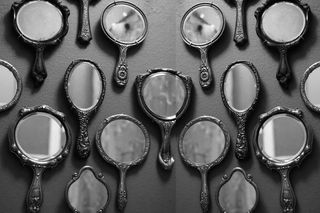
People Recall the First Time They Felt They Weren’t Beautiful
The subtle commentary that underpins poor self-image almost always starts with family.

Physical beauty or attractiveness is a social construct. Unrealistic beauty standards — being tall, thin, fair, or having clear skin, a full head of hair, symmetrical features — are peddled to most of us since childhood. How do these take root in our psyches, and how, if at all, do these pervade our adult interactions, relationships and self-perceptions?
The Swaddle spoke to people about how and why they were made to feel beautiful or not beautiful, how they were first made conscious of their appearance, how they started evaluating their physical appearance and attributing value-based judgments to it, and how that has affected their life lives.
*
D.H., 24, was in the fifth grade when her parents noticed she wasn’t tall enough and insisted she start cycling and skipping rope, in hopes she would get taller. She was in the 11th grade when she started gaining weight and her parents made her feel fat, and therefore, ugly, compared to the kids around her. In college, people would tell D.H. guys would line up for her only if she lost some weight. Now at 24 and ready to date or be married, she says her father’s “classic statement” is: “You are not presentable in the market, so once you become presentable” — lose weight, D.H. clarifies — “you might not have to make any compromises in life.”
D.H. remembers being a happy person, unconcerned with her appearance, before class 5. “I never felt the need to correct my body when I was a kid. I was very much confident about myself,” that is until all of the comments started — then, losing weight became “the only purpose” in her life. Diagnosed with mild anxiety and depression as an adult, she often binges on sweets and actively avoids meeting people. “I avoided meeting or dating any guys thinking about how they would feel about me, and honestly I was scared of rejection.”
“I’ve started seeing my body through other people’s eyes. I have never given so much importance to my body as much as I’m giving it right now,” D.H. said. “I’ve decided I’ll start dating only when I’ve lost a substantial amount of weight and meet that guy I always wanted to. This has become my thought process. I can’t believe this is what I’ve become.”
*
Akanksha Srivastava, 23, remembers a comment made by her maternal grandmother when Srivatava was 12, which has stayed with her into adulthood: “She said, that when I was born, she looked at me and said, ‘That’s a really ugly baby.’ I [have] sisters that [look] better, but I got my mom’s nose and it’s been the punching bag whenever someone wants to trigger me,” Srivastava recounted. “I naturally grew up as someone who didn’t think I’d get a boy who’d look at me and like me back.”
Related on The Swaddle:
Body Positivity is Excluding People; What if We Got Rid of Beauty Instead?
Srivastava underwent bouts of acne in school, too, which has left old marks and slight bumps across her skin. “[My parents] forced me to go to dermatologists and homeopathy, and honestly, it took a mental toll talking about it to a new doctor every single time.” Now that she lives by herself, she enlists the help of body positivity communities online and says she doesn’t entertain any discussion of her physical appearance, even on dates. “Even though this physical body is my home, it’s not a place that deserves this much discussion,” Srivastava said.
*
Arpita, 25, remembers her family correcting her appearance “since the very beginning.” She was told to lose weight because she didn’t “look good.” Then, she was told girls are supposed to keep their hair long. Then, she was asked to wear clothes that fit properly, were not loose, and that covered up all of her skin.
“It always starts with [the] mother, then other female relatives. Later on, it is classmates. We have been conditioned from the time we didn’t actually have what we call perception. All one feels is irritation and anger,” Arpita said. “I have been told so much about myself that I am at constant war with myself. On one front, I want to accept myself the way I am. But on the other hand, criticisms from family groups somehow get to your heart.”
*
Simran, 23, experienced her family trying to correct her appearance early on. “Uncles and aunties at family gatherings always enjoyed comparing how their kids looked. The comparison was laid out like a competition between cousins: Who’s skinnier. Who’s darker. Who’s taller,” she said. “I was the fat-but-could-get-taller kid. So, there was always a goal set for us to reach. I spent a lot of my childhood chugging Complan, but it didn’t help at all.”
Before the comments and the competition with cousins started, Simran didn’t put a label on her physical appearance, she says; as a kid, she never thought about her appearance. Through the years, however, the comments got to her. “For a large part of my life, I did believe whatever they said. I’ve come a long way from where it had started, but there’s still a lot more of this to unlearn. All this has led to a whole bunch of insecurities, and they don’t look like they’re going away any time soon. In the grander scheme of things, I just feel like I am not enough. I don’t meet expectations, and that’s disappointing,” she said, adding that she wishes she could be less conscious of her body at any given time. “It’s mostly a struggle between trying not to care about what others view me as but also secretly wanting validation from the same people. It’s kinda fucked up. And even when people aren’t judging how I look, in my mind I always think they are. So that’s another fucked up part.”
*
For Alaric Moras, 24, [full disclosure: Alaric is a past contributor to The Swaddle] the women in his family were obsessed with his dark skin, and would often comment on his tan after he went to play outside in the sun, lest he became “black,” a word Moras said was derisively uttered with racist connotations. He was often compared to his brother, who was fairer and thus the object of his family’s enthusiastic compliments. “I really just entirely saw myself from this lens. I was not able to dissociate myself from my family’s perception of me for a very, very long time. In many ways, my coming out and me being gay has been a huge blessing because it has helped me break away from these lenses [too],” Moras said. It was only when a former partner made Moras realize he was beautiful, that Moras questioned what he had believed all his life. “I broke down, I started crying. Till that date, I had never, even after years of therapy … questioned that paradigm, the idea that my brother was better looking than me with the implicit assumption that it was because he was fair.”
Moras is increasingly looking at himself removed from how others see him, he said, adding he’s the healthiest he’s ever been. “And I am seeing that if people do not start seeing the beauty inside me, I don’t…. need that engagement. Yes. Ok. Sure. It affects you how people see you. But if you don’t build up inner resilience to rubbish external narratives about looks and beauty, then you drown in others’ opinions,” he said, adding a Virginia Woolf quote: “The eyes of others our prisons, their thoughts, our cages.”
*
M.M., 31, says he has been overweight his entire life. For the longest time, he never felt a need to correct his appearance and found his “best friend” in food. He believed he would fall in love with someone. When he fell for a girl, M.M. found himself evaluating the men she liked — they were physically fit — and made a judgment about his own appearance through that lens.
“I may be wrong, but we decide beforehand, only in our minds, if this person is capable of being a sexual partner or no. And this decision is based on looks, which then maybe results in getting to know the person and getting into a relationship with them,” M.M. said, adding this inner realization made him want to lose weight. “The perception of myself was — I am nobody until someone notices me. And the irony being I am a huge guy … But now it’s different. I am on a successful weight loss journey for three months, not in love with anyone but just myself. I felt that people were shallow as they fell for looks and not looking at what is inside … but I then realized I was one of those people as well.”
*
K.D., 24, was made aware of her appearance as the people around her started having conversations about body and facial hair — mainly, the unwanted-ness of it. “Seeing my mom get rid of hers by waxing, made me feel like it was almost a right of passage to being a woman. I couldn’t wait for my turn,” she said. Her parents, grandparents and other family members would always comment on her body, K.D., said — sometimes telling her she could be a model, other times criticizing her for putting on weight, or asking her if she was doing drugs because she lost weight and looked sick.
Related on The Swaddle:
Toxic Beauty Rituals Still Plague Women in a Society Obsessed With Skin Care
“I learned early on that there is no pleasing people and it’s not worth your time to try with your appearance,” K.D. said, adding she realized others’ opinions did not have to change how she viewed herself. “I accepted their opinions but would always use comforting words to myself in [an] effort to counteract and make sure they didn’t affect me.”
But unlearning beauty isn’t as easy; K.D. admits it’s an uphill battle. “There’s constantly so much content in my face of ‘how to be this, that and the other’ that I do feel like my body might not be fit enough or my skin doesn’t look healthy enough,” she said. “It’s a smart mix of ‘wellness’ and ‘wellbeing’ that we get sold, but it’s really just aesthetic. Point is — I have to remind myself often to have my own standards built of my own knowledge and understanding of what my appearance is and what I want it to be. And constantly question everything.”
*
Anahita, 23, has been getting comments about her looks since she was a young girl, actively engaging in dancing and sports such as basketball. “I’ve had comments on getting chubby, gaining weight, being too muscular, sometimes too skinny/ thin, not having curves in places where people want them, et cetera, et cetera. It happens over a long period of time till it’s instilled in you to be critical of yourself. And undoing that is a painfully hard process,” she said, adding she realized her processes of critical self-evaluation decrease every time she’s isolated — say, traveling — and away from family.
Most concerned with being able to do the things she loves — dance, play sports — initial comments on Anahita’s body made her feel she had to look a certain way to engage her passions. “I have been able to start the process of unlearning it because I’m more active than ever and watching my body being able to achieve things in its natural shape and form is very rewarding,” she said. “Unlearning taught me that I don’t need to look a certain way to achieve my goals and I’m just happy that I am able to achieve functional tasks.”
“It’s possible to unlearn, especially if you make yourself more aware of the ridiculous and unhealthy standards, but I’m not sure if it can be completely, 100% unlearned,” she added. “Hopefully that comes with time.”
Rajvi Desai is The Swaddle's Culture Editor. After graduating from NYU as a Journalism and Politics major, she covered breaking news and politics in New York City, and dabbled in design and entertainment journalism. Back in the homeland, she's interested in tackling beauty, sports, politics and human rights in her gender-focused writing, while also co-managing The Swaddle Team's podcast, Respectfully Disagree.
Related


From Open Books to Locked Accounts: Inside the World of Finstas and Alt Twitters
